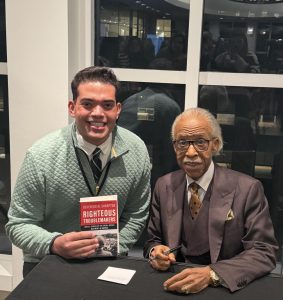As he took his seat, I realized how unique this event was. Reverend Al Sharpton. Students had gathered for this discussion from all around the tri-state area on this frigid Friday evening.
With a steady stream of journalists arriving, I could feel the energy everyone brought. We were at the Paley Center For Media in midtown Manhattan. At the front of the room, a stage with a podium and two seats stood– one for our student moderator and another for the Reverend.
For some background: I am a political science major and a journalism minor. This event was at the intersection of my interests, and the fact that it had such a prominent attendee made it that much better.
I also think town halls are an excellent medium for educating oneself and participating in profound conversations. I encourage you to attend town halls that interest you.
In the minutes leading up to the event’s start, another member of our campus chapter of the Society of Professional Journalists and I spoke with the event’s moderator and wished her good luck.
Reverend Al Sharpton has been a prominent figure in the political arena for a long time, but more importantly, he has been a notable Civil Rights activist. One of his most impressive achievements was the founding of the National Action Network in 1991. The organization serves as a democratic force, and its mission is to increase voter education, registration, and representation of all groups. It also fights discrimination in housing, accommodations, education, and several other areas. Simply put, this altruistic organization serves to help those who lack a voice.
Over the years, Sharpton has led numerous marches across the country, refining his mission of helping others.
When asked what and how the Black community should act following rollbacks in DEI, and other initiatives that have been worked on for decades, Sharpton said: … “Well, you march, y’all dramatize. Y’all make noise. That’s the point. Marching is not designed to solve the problem. It’s to expose the problem. And once you expose the problem, it forces those in the legislature or in the corporate world to adjust to it, but if they can keep you quiet [and] if there’s silence, no one will ever come and voluntarily ask you, how do we fix this?”
Later, I had the opportunity to ask the Reverend a question.
I asked: “…I recently read a New York Times article published in 2019 that claimed you and Donald Trump were the ultimate New York frenemies. The article went on to explain how you and Trump have had a tumultuous relationship. Later, on July 29, 2019, Trump took to Twitter and said, “…Al [Sharpton] is a con man, a troublemaker, always looking for a score.” What are your thoughts on this statement, and how has your relationship with Trump evolved?”
I must admit, before asking my question, I was somewhat nervous–but after asking it, I was eager to hear Sharpton’s response.
Sharpton added: “Well, I think that, as I said in the late 1990s, I marched Donald Trump for the second time, the first time Donald Trump and his father were cited by the Justice Department for having discrimination in their real estate ventures. It was found by the Justice Department in 1973–under Richard Nixon, this was not a liberal Justice Department. People would apply for an apartment in one of their buildings, and on applications they put “C” if you were black, meaning colored. Then you go to the Central Park Five. So that’s why we would march on it. He later tried to act like he was supportive of Democrats. He supported Charlie Rangel and others. He would come to my convention for the National Action Network. So I don’t know when I became a con man. Y’all are journalists. Ask him when and who I conned, but it’s hard for me to become offended when a man who is a felon, [with] 34 felony convictions, attacks me. I usually pray with felons.”

Editor’s note: This event was broadcast live and can be watched here: https://www.youtube.com/watch?v=mKy-Qktylo8
When we finished asking the questions, Reverend Sharpton headed towards a table set up by the entrance of the room, where he would be signing copies of his latest book, Righteous Troublemakers.
When it was my turn, I thanked Sharpton for coming to encourage students and sharing his insights.
I am indebted to the experiences that our chapter of the Society of Professional Journalists and my professor, Dr. Hirshon, and his desire to give students unique experiences have had on my college experience. This is precisely why I constantly encourage others to become involved with organizations like WPSPJ.
This experience, along with the Reverend’s advice, made me realize that, as a society, we must become more involved in our communities and voice our concerns. We cannot allow everything we disagree with–or can have detrimental effects on the common (capital G) Good of the people–to go unheard.